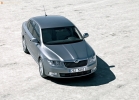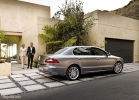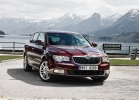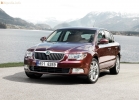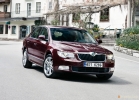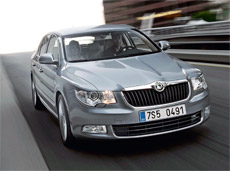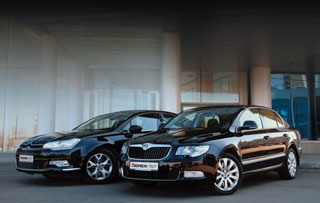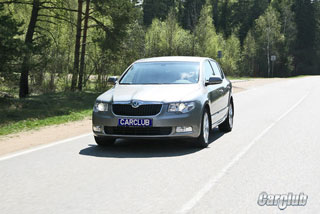Skoda Superb test drive since 2008 -
Skoda Superb: Now the turbodiesel
About the new flagship Skoda - the Superb model, located almost at the same level with representative cars, we already talked on the pages of AG. In one of the previous numbers you could read the test of this car - then we rode on the latest Skoda Superb with a gasoline six -cylinder engine. Now we have a diesel version on the test ...Like all cars of cars produced under the patronage of the VW concern, Skoda Superb, in addition to several options for equipping and a long list of options, has a whole gamut of power gasoline and diesel units - four- and six -cylinder, which can be combined both with mechanics and an automatic box programs, including Tiptronics. The almost flagship version came to us for the test-Skoda Superb with a 2.5-liter turbodiesel, which in the internal tablets about the ranks stands at about the same level with a 2.8 V6 gasoline top version. They have no visual differences: outside the cars are identical to each other, although some features were found inside. From the previously tested version with
2.8 -liter gasoline V6 diesel is not only characterized by a type of power unit, but also with a complete set - everything was in the car, including a leather interior.
But neither the color, nor the equipment, nor even the driving qualities of the car were interested in us, because we already had the opportunity to make sure that in this model - all O'Kay. We were most interested in how the sensations of this high -class car change, depending on which engine is under the hood. Speaking differently: does it make sense to buy a turbodiesel version instead of magnificent gasoline? After all, the price of both cars is almost the same. The difference between gasoline and turbodiesel modifications in the Comfort configuration is less than a thousand euros. And running qualities, especially dynamics and economy, sometimes diesel modifications are not much worse than in gasoline ...
With this, perhaps, let's start. Since the purpose of our test was precisely acquaintance with the turbodiesel, then you should start with how it behaves. At idle
A 2.5 -liter turbodiesel, which is already familiar to us from other models of the VW concern, works quietly - in terms of sound insulation, a car with TDI index is not inferior to gasoline versions. True, vibrations are present, especially on the steering wheel and lever the checkpoint - not much, but still felt. But as soon as the arrow of the tachometer slightly rises from the zone of idle, vibrations instantly disappear, as if they were not at all. But, as if in return, the sound of the motor is manifested - the well -fed rumbling of the six -cylinder engine will chase you the whole trip, even if the climate control system fan works at high speeds. And the stronger you spin the engine, driving the tachometer arrow higher and higher, the more often catch yourself on the fact that the sound of the motor clearly dominates all the other sounds heard in the cabin. This could be called a minor drawback, if not for one but: the engine did not want to accelerate from low speeds, so for active drive it constantly has to be twisted to high speeds. And this means that you will have to listen to his bass solo constantly: both on acceleration and at high speed. Although, in principle, this is not such a problem. Even at maximum speed, the engine does not suppress its noise, it is simply present. Maybe we were just impressed with a silent gasoline superb ...
But in terms of traction and dynamics, the version with a turbodiesel is not much inferior to gasoline analogues. It is worth only the tachometer arrow to go for the mark of 2000, how strong acceleration presses you into the seat.
If you switch the programs in a timely manner, then the exercise acceleration from a place to a hundred will take you only 9.5 seconds. A good result - the owners of six -cylinder gasoline models dreamed about such dynamics about five years ago. True, in order to drive Superb
2.5 TDI on an equal footing with powerful gasoline cars, you will often have to turn to the gear lever, which, incidentally, is not distinguished by high clarity of work. For normal and confident acceleration, it is better that the engine constantly works in the average revolutions, then for each touch of the gas pedal, the machine responds with instant acceleration. But if the revolutions are lost, then the dynamics of acceleration from the excellent instantly turns into frankly sluggish until the engine reaches the above -mentioned line of 2000 rpm. From this moment, a turbine enters into work, which makes this car swift. This drawback can also seem to be insignificant, but in real operation it will be too noticeable in a car with a mechanical gearbox: with each speed reduced, it will almost always have to turn on a lower gear.
What is the end? A good, European car of a prestigious brand, with an incredibly spacious interior and rich equipment. Price? More than acceptable. Handword? At the level, even the features that we listed above are not able to spoil the impression of this car. So asking what Superb to choose: diesel or gasoline?, You will have to choose what is the most priority for you: the silence in the cabin and the stunning dynamics of a gasoline car with a six -cylinder engine or the efficiency of diesel ...
SUBJECTIVE OPINION:
(+) High assembly quality, European design, spacious, especially behind, salon.
(-) The sound of a working engine in the cabin, the slurred operation of the checkpoint, the thrust at low speeds.
Text: Pavel Kozlovsky and Sergey Mitskevich
Video Skoda Superb test drive since 2008
Video crash tests Skoda Superb since 2008
Skoda Superb test drive since 2008
Skoda Superb crash test since 2008
Krassh Test: Detailed Information35%
Driver and passengers
18%
Pedestrians
40%
Children-passengers
Skoda Superb malfunctions since 2008
Skoda Superb malfunctions: detailed information| Superb since 2008 | |
|---|---|
| Engine |  |
| Transmission |  |
| Control system and suspension |  |
| Brake system |  |
| Air heating and air conditioning |  |
| Launch and charging system |  |
| Electric components and so on |  |
| Corrosion body stability |  |

